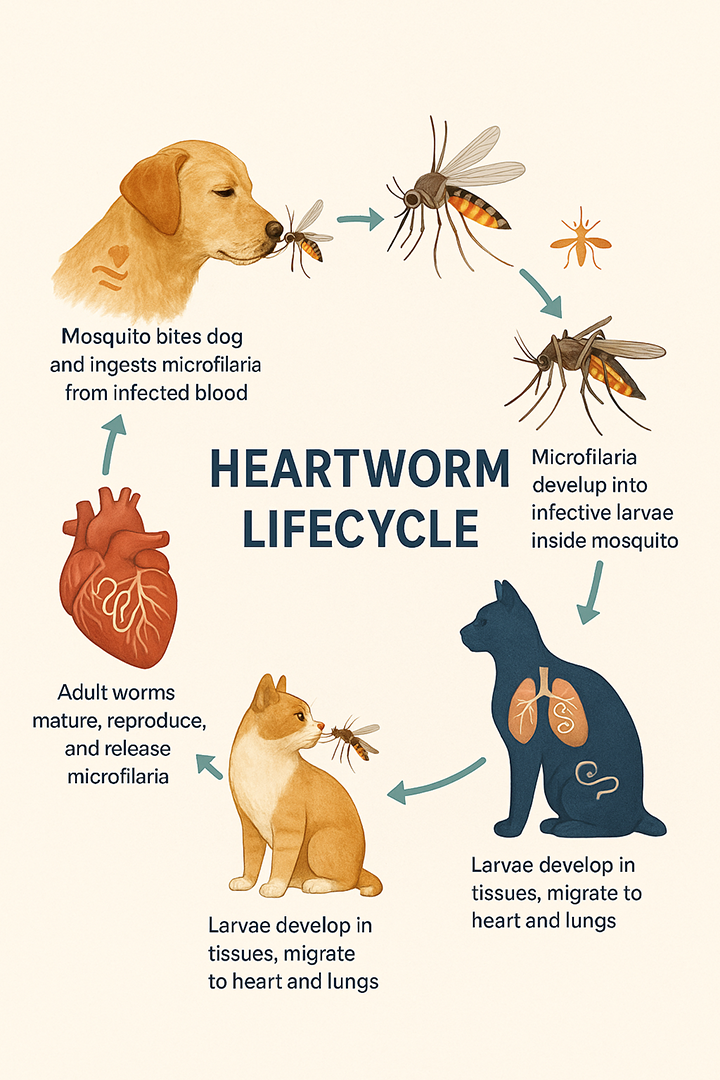Heartworm Disease in Dogs
What are heartworms in dogs and cats?
Heartworms are parasites spread by mosquitoes, meaning even indoor pets can get them. Basically, the mosquito bites the cat or the dog, injecting them with the immature stage of the heartworm that then, over time, migrates to the heart where they reach sexual maturity and can reproduce. The scary thing is there might not be any signs for a long time. If a pet has a low parasite burden, meaning only a few worms in the heart, you might not see anything. But eventually, as the parasites reproduce, more and more of them can form in the heart and the vessels around the heart. That is what leads to the clinical signs. You can get heart enlargement, heart failure, and pulmonary hypertension. Although the only clinical sign you might see initially might be a little coughing.
How do you diagnose heartworms in dogs and cats?
We diagnose heartworms with routine screenings. Every year, we want to do heartworm tests. It's just a small blood sample, and we can detect the sexually mature stage of the heartworm. You should always test your pet for heartworm if you've missed multiple doses of your heartworm prevention, or at six months when they're puppies, we start to do heartworm testing.
How are heartworms spread?
Heartworms aren't transmissible directly from dog to dog. The way it spreads is that a dog with heartworm gets bitten by a mosquito, and then that mosquito carries the immature stage of the heartworm and bites another dog, spreading it to that other dog. By having all of our pets on heartworm prevention, we're preventing the spread as well as protecting your own dog from getting the parasite.

What heartworm preventions are available for cats and dogs?
For cats, we generally use either Revolution Plus or Bravecto Plus. It's a topical that you apply either once a month or once every other month, depending on the product. For dogs, we usually use heartworm pills. We also have the Pro Heart shot available if your dog doesn't take pills well. Heartworm preventives are very safe. Pretty much every dog is on them. They've been used for years, and we see minimal side effects. Dogs take them as treats and do very well on them.
What happens if heartworms are untreated?
If you don't treat heartworms, it varies in the animal. For cats, since they aren't the definitive host for heartworm, they generally have a low parasite burden. It might resolve on its own or cause clinical signs. It's hard to predict. For dogs, being the definitive host of the parasite, the parasite can reproduce, forming lots of worms that can grow to a foot in length in the heart and surrounding vessels. That's when you get heart enlargement, pulmonary hypertension, and potential heart disease that can't be reversed if these chronic changes have already taken place.
What if I miss a dose of heartworm prevention for my pet?
If you've missed one month, it should be fine. Just start again. If you miss multiple months, ideally we do a heartworm test to ensure it's negative, and then you start back up on the medication.
Why is heartworm prevention important for my dog and cat?
One of the reasons heartworm prevention is so important is because the treatment is very difficult. It's basically a year of treatment. You can visit the American Heartworm Society website to see the whole protocol, but it generally involves painful shots that we administer to kill the adult heartworm. During this treatment, we have to monitor closely for any reactions as the worms die off. It involves giving this painful shot and monitoring them here for a whole day. We have to do this three times and conduct various tests to ensure no immature or mature heartworms remain. They're on prevention during this whole time anyway, so we might as well prevent it. Not only is it painful when we give these injections to kill the adult worms, but it's also expensive. It is multiple times cheaper just to do the prevention and avoid this whole ordeal of treating adult heartworms.
Interested in learning more? Contact Town and Country Animal Hospital at (703) 273-2110 or email us at [email protected]. Our team is here to answer your questions and help schedule your pet’s visit.
